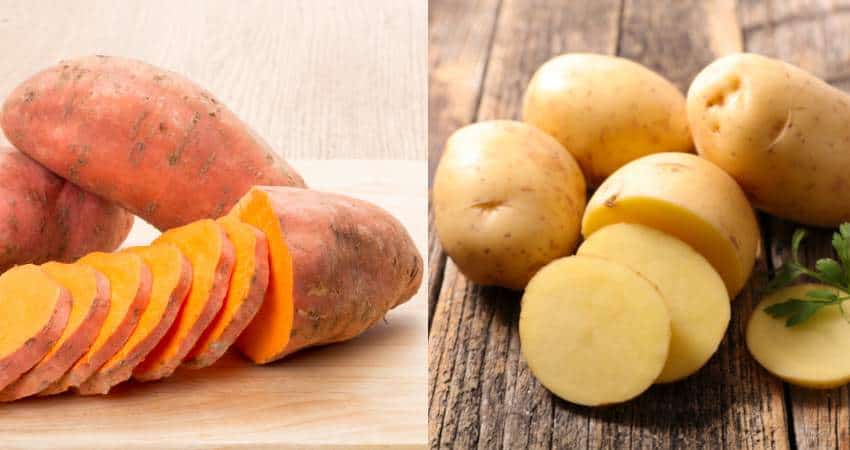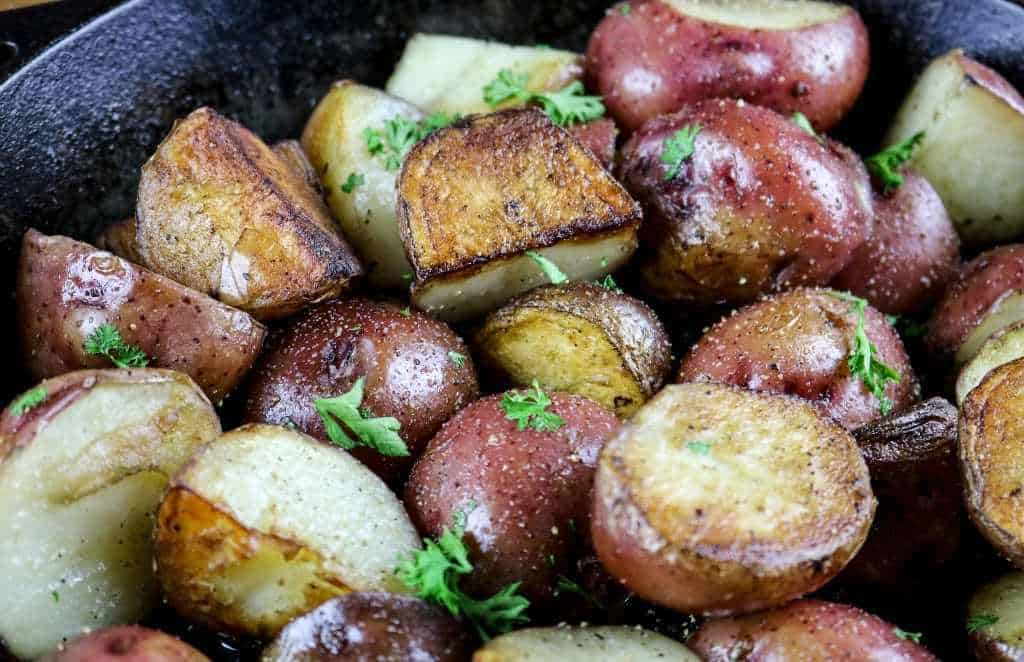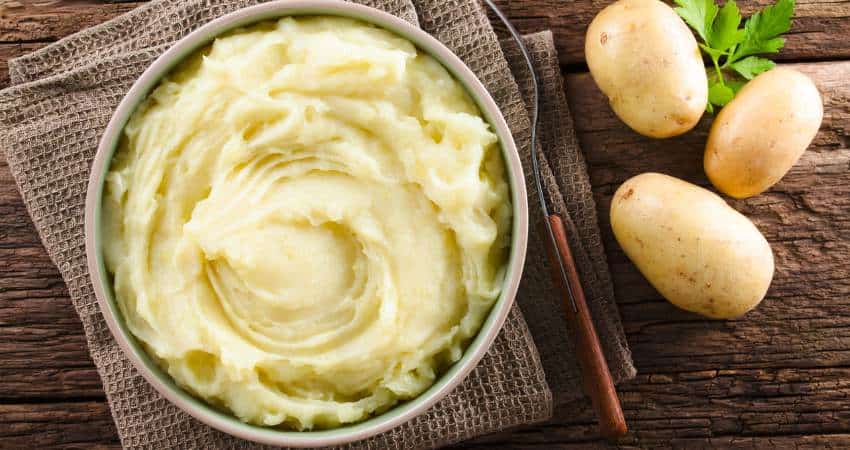Sweet Potatoes vs Potatoes: Which Potato is Healthier?
As a Certified Health Coach, the topic of sweet and regular potatoes come up often during my sessions. It seems only yesterday sweet potatoes came in and became the newest health craze. Let’s answer, are sweet potatoes healthier than potatoes?
Sweet potatoes and potatoes are both highly nutritious and offer health benefits. Sweet potatoes has a lower glycemic index and more antioxidants, vitamin A, vitamin C, fiber and beta-carotene. Potatoes provide more potassium, iron, niacin and folate.
In this article, I’ll include a side-by-side nutrient comparison and examine the benefits of each nutrient and why they make potatoes healthy. In addition, I’ll take a look at some healthy ways you can cook either potato.
In addition to coaching clients about them, I’ve purchased, researched and consumed both prior to, during and after writing this article. Potatoes are part of my regular nutrition plan.

Sweet Potatoes and Potato Nutrition
The following table is a side-by-side comparison of the nutrients:
| Sweet Potato
Raw (100 g) |
White Potato
Raw (100 g) |
|
| Calories | 77 | 89 |
| Protein | 1.57 g | 2.05 g |
| Carbohydrates | 17.5 g | 20.1 g |
| Fiber | 3.0 g | 2.1 g |
| Fat | 0.05 g | 0.09 g |
| Vitamin A | 14,200 IU | 2 IU |
| Beta-carotene | 8,510 mcg | 1 mcg |
| Vitamin C | 19.2 mg | 17.2 mg |
| Vitamin B6 | 0.20 mg | 0.29 mg |
| Vitamin B9 (Folate) | 11 mcg | 15 mcg |
| Vitamin B1 (Thiamin) | 0.07 mg | 0.08 mg |
| Vitamin B2 (Riboflavin) | 0.06 mg | 0.03 mg |
| Vitamin B3 (Niacin) | 0.55 mg | 1.06 mg |
| Vitamin B5 (Pantothenic Acid) | 0.8 mg | 0.2 mg |
| Magnesium | 25 mg | 23 mg |
| Phosphorous | 47 mg | 57 mg |
| Potassium | 337 mg | 425 mg |
| Iron | 0.61 mg | 0.81 mg |
| Copper | 0.15 mg | 0.11 mg |
| Calcium | 30 mg | 12 mg |
| Zinc | 0.3 mg | 0.3 mg |
| Manganese | 0.25 mg | 0.15 mg |
Nutrient Resources ((USDA: Sweet potato, raw, unprepared))1
Sweet potatoes and white potatoes are similar in calories and carbohydrates. White potatoes provide a good amount of B vitamins and minerals. Sweet potatoes provide a good amount of Vitamin A, Beta-carotene, fiber and Vitamin C.
While sweet potatoes may have a slight nutritional advantage over white potatoes, it’s not significant enough to warrant ditching regular potatoes.
Sweet potatoes are rich in antioxidants helping to fight damage to the body’s cells caused by free radicals.
White potatoes contain glycoalkaloids. They are compounds which have been shown to possess anticancer effects in studies2.
Let’s examine all the health benefits and nutrition potato and sweet potatoes offer.
Sweet Potato and Vitamin A
Beta-carotene is a compound present in sweet potatoes giving it its orange color. The body converts beta-carotene into vitamin A. As you can see in the table above, they contain 8,510 mcg and white potatoes 1 mcg.
Vitamin A is a powerful antioxidant that can help reduce cellular damage by controlling the negative effects of free radicals3.
An increased number of vitamin A has been shown to fight and prevent cardiovascular disease, which is the leading cause of death in the United States4.
Vitamin A also helps:
- Eye health
- Cognitive function
- Cancer protection
- Skin protection
A medium-sized baked sweet potato contains 438% of the recommended daily intake of vitamin A. Compare this to a white potato, which contributes 0% of the recommended daily intake.
Vitamin C
Both potatoes provide a good amount of vitamin C which is probably known more for its immune system benefits. High blood levels of vitamin C may be an indication of overall health. It helps more than just the immune system. It helps protect the following:
- Cardiovascular disease
- Stroke
- Eye health
- Cancer
- Blood pressure
- Prevent iron deficiency
A study released in 2012 found vitamin C supplementation reduced systolic and diastolic blood pressure. The researchers noted increased vitamin C intake, supplementation and higher blood levels of vitamin C are associated with lower blood pressure5.
Carbohydrates
Carbohydrates have gotten a bad rap over the past couple of decades. The truth is, carbohydrates have many health benefits and are essential to a healthy diet. If you’re not eating enough carbohydrates, then that’s going to be an issue.
The problem, though, is that most Americans are eating too many unhealthy carbs. An overabundance of unhealthy carbs can also be problematic as it can lead to diabetes6.
Unhealthy carbohydrates include the following:
- Added sugars.
- Refined grains which have been stripped of their fiber, vitamins and minerals.
- White flour
- White rice
- White bread
- Pasta
- Soda
- Pastries
- Sweet deserts
- Cereal with added sugar.
Refined carbohydrates are digested quickly and have a high GI index. This raises blood sugar and causes spikes. Keep reading the next section to learn more about The GI index.
If you suspect you’re eating too many carbs, here’s some good news, a potato isn’t a refined, unhealthy carbohydrate. In addition, a medium-sized baked sweet potato contains 23.6 grams (0.83 oz) of carbs, while a medium-sized baked white potato contains 36.6 grams (1.29 oz).
A lower volume of carbs can make sweet potatoes a healthy choice for you as they can help you balance out the number of carbs on your plate.
Find out how potato and rice nutritional values compared in my article, Potato vs. Rice Nutrition: Which is Better?
Glycemic Index of Sweet Potato and Potato
The Glycemic Index (GI) is a scale that measures how fast a particular food raises (or spikes!) your blood sugar levels7. As you may know, blood sugar spikes can lead to complications with your heart, kidneys, eyes, and nerves.
In general, you should try avoiding eating high-GI foods. Foods on the GI scale are categorized as:
- Low-GI foods: under 55
- Medium-GI foods: 55-70
- High-GI foods: over 70
How blood sugars levels are affected:
- Foods with a glycemic index over 70 cause a more quicker spike in blood sugar levels.
- Foods with a glycemic index 55 to 70 cause a moderate spike in blood sugar levels.
- Foods with a glycemic index under 55 cause a slow spike in blood sugar levels.
A boiled sweet potato has a GI of 63, making it a medium-GI food. A white potato has a GI of 78, putting it well above the high-GI food threshold.
If you’re looking to regulate your blood sugar levels, then sweet potatoes are a smarter dietary choice because of their lower GI.
How to Lower the Glycemic Index
To lower the GI even more, baking sweet potatoes results in a higher GI than boiling does because of how the starches gelatinize during cooking.
- Boiled sweet potatoes have a GI of 44. Baked sweet potatoes have a GI of 94.
- Boiled white potatoes have a GI of 54. Baked white potatoes have a GI of 73.
In addition, consider eating the boiled potato cold than hot. A study published in the Journal of the Diabetic Association found boiled potatoes eaten cold had a GI score of 56. When eaten hot the boiled potato had a GI score of 898.
To achieve the lowest glycemic number possible, eat a cold, boiled sweet potato.
Find out how Russet potatoes compared to red potatoes in my article, Red Potatoes vs Russet Potatoes: The Differences.

Calcium
Sweet potatoes provide 30 grams of calcium. Calcium is important for the heart and blood pressure. Harvard Health reports calcium helps maintain blood pressure by helping in the controlling of the relaxing and tightening of blood vessels9.
Calcium also helps the following:
- Helps muscles function properly.
- Improve nerve function.
- Build and maintain strong bones.
Dietary Fiber
Sweet potatoes provide 3.0 grams compared to 2.1 for white potatoes. Many of the carbohydrates in potatoes are mostly fiber and starch. These types of carbs help you stay healthy and lean. The fiber doesn’t get digested.
Instead, it gets fermented in the gut and produces short chain fatty acids10.
Short chain fatty acids and fiber may help with the following:
- Helps you feel full longer.
- Stimulate blood flow to the colon.
- Increases nutrient absorption.
- Decrease inflammation.
- Decrease the risk of colon cancer.
- Fuels healthy gut bacteria.
Find out how Russet compared to Yukon Gold Potatoes in my latest article, Yukon Gold Potato vs Russet Potato: What’s The Difference?

Find out how purple sweet potatoes and purple yams compared to each other in my article, Purple Sweet Potato vs Purple Yam: What’s The Difference?
White Potatoes and B Vitamins
The B vitamins provided by white potatoes include the following:
- B1 (thiamin)
- B2 (riboflavin)
- B3 (niacin)
- B5
- B6
- B9 (folate)
- B12
B vitamins help support the following:
- Energy levels.
- Cardiovascular disease.
- Brain function.
- Digestion.
- Nerve function.
- Red blood cells.
A lack of B vitamins has been associated with oxidative stress and neural inflammation. In a study released in 2018 32 healthy adults were given B vitamin supplementation for six months.
The results indicated preliminary evidence B vitamin supplementation reduced oxidative stress and inflammation11.
Find out how potatoes compared to bread for nutrients and benefits in my article, Potatoes vs Bread: Which is Better? A Complete Comparison.
Potassium
White potatoes provide 425 mg of potassium. It helps the body get rid of excess sodium reducing fluid build-up. These help keep systolic and diastolic blood pressure lower ((American Heart Association: How Potassium Can Help Control High Blood Pressure)).
According to Harvard Health, a number of studies have shown a connection between low potassium levels and high blood pressure12.
The more potassium, the more sodium your body will lose. Consuming too much sodium or not enough potassium throws off the delicate balance the kidneys need to remove the excess water13.
Find out how white sweet potatoes compared to sweet potatoes in my article, Sweet Potatoes vs White Sweet Potato: What’s The Difference?
Weight Loss
If you’re trying to lose some inches from the waist line, it isn’t always the easiest task. Let’s take a close look at which potato is better for weight loss.
Sweet potatoes are better for weight loss than white potatoes due to its slightly fewer calories and carbohydrates. They also contain more fiber which has been shown to help increase fullness and slow down digestion.
Healthiest Ways To Cook Sweet Potatoes and Potatoes
It is important to keep in mind that both sweet potatoes and white potatoes can be deeply unhealthy if you choose to deep fry them. They’re also not going to be very healthful if you’re going to mash them with heavy cream and loads of butter.
In other words, there’s no use in choosing the healthier potato if you’re going to cook it in an unhealthy way. The method of preparation is almost as important as the nutritional composition of the ingredients you use.
Here are a few ways you can cook a potato to ensure you’re getting the most of the health benefits, while also ensuring the cooked potato is tasty enough:
- Keep the skin on for added fiber.
- Boil, steam, or microwave them for a lesser impact on blood sugar.
- Bake potatoes with seasonings and just a little bit of olive oil.
- Top them with healthy toppings like lean protein (beans, white-meat poultry without the skin) and herbs instead of loading them up with cream, bacon or butter.
- When making fries, bake them instead of frying them in unhealthy oil.
- Don’t add cheese to the fries.
Half of the fiber from potatoes is in the skin. Consider leaving the skin on and actually eating it. Prior to cooking it, make sure to wash the skin well to remove any dirt.
If you follow these directions, there’s no reason why you shouldn’t be able to fit sweet or white potatoes into a healthy diet. Just remember being mindful of your portions, as over-eating can result in other health risks.
If you’re interested about how sweet potatoes held up against pumpkin for health and nutrition, check out my article, Pumpkin vs Sweet Potato: A Complete Comparison.
Find out if Russet potatoes and Idaho potatoes are the same in my article, Idaho vs Russet Potatoes – Are They The Same? Let’s Compare

If you have any questions about this article don’t hesitate to email us. You can find an email on our contact page.
Read Next – More Food Articles!
Sweet Potato vs. Butternut Squash: A Comparison
Purple Sweet Potato vs Sweet Potato: What’s The Difference?
Sweet Potato vs. Russet Potato: What’s The Difference?
Red Potatoes vs Yukon Gold Potatoes: What’s The Difference?
Sweet Potato vs Yam Nutrition and Benefit Differences
Turnip vs. Potato: What’s The Difference? Let’s Compare
Cassava vs. Potato: Are They The Same? Let’s Compare
- USDA: Potatoes, flesh and skin, raw [↩]
- National Center for Biotechnology Information: Chemistry and anti carcinogenic mechanisms of glycoalkaloids produced by eggplants, potatoes, and tomatoes [↩]
- National Center for Biotechnology Information: Free radicals, antioxidants and functional foods: Impact on human health [↩]
- National Center for Biotechnology Information: Antioxidant potentials of vitamin A and carotenoids and their relevance to heart disease [↩]
- National Center for Biotechnology Information: Effects of vitamin C supplementation on blood pressure: a meta-analysis of randomized controlled trials [↩]
- National Center for Biotechnology Information: High-glycemic index foods, hunger, and obesity: is there a connection? [↩]
- Harvard Health Publishing: Glycemic index for 60+ foods [↩]
- National Center for Biotechnology Information: Glycemic index of potatoes commonly consumed in North America [↩]
- Harvard Health: Key minerals to help control blood pressure [↩]
- National Center for Biotechnology Information: Dietary fiber isolated from sweet potato residues promotes a healthy gut microbiome profile [↩]
- National Center for Biotechnology Information: The Effect of a High-Dose Vitamin B Multivitamin Supplement on the Relationship between Brain Metabolism and Blood Biomarkers of Oxidative Stress: A Randomized Control Trial [↩]
- Harvard Health: Potassium lowers blood pressure [↩]
- National Center for Biotechnology Information: The Effect of the Sodium to Potassium Ratio on Hypertension Prevalence: A Propensity Score Matching Approach [↩]
